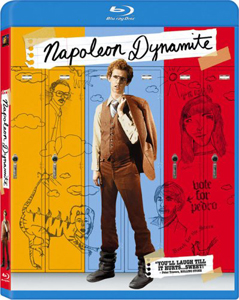“Napoleon Dynamite” (2004) has a simple but ingenious concept: Tell a typical coming-of-age story, but have almost everyone be super awkward in their performances. Like how real high school kids are, but even more so. Instead of stylizing them to be cooler, stylize them to be less cool.
Husband-and-wife team Jared (director/writer) and Jerusha Hess (writer) communicate this idiosyncratic style to their cast – especially Jon Heder as carrot-topped, mouth-breathing, lanky Napoleon – and purposely make the direction, framing and editing awkward or nontraditional.
One of my favorite moments is at the requisite spring dance. Napoleon purposely swallows a wad of gum in a close-up. Then we smash reverse-inline cut to a wider angle and Pedro (Efren Ramirez) and Deb (Tina Majorino) are standing right next to him like manikins, not saying anything. In fact, they don’t speak until Napoleon – unfazed by their sudden pop-up – asks them if they’ve seen Trisha.

“Napoleon Dynamite” (2004)
Director: Jared Hess
Writers: Jared Hess, Jerusha Hess
Stars: Jon Heder, Efren Ramirez, Jon Gries
“Napoleon Dynamite” is one of those movies that get lots of 10s and lots of 1s on IMDb. If you vibe with this type of humor – totally original yet dependent on a viewer’s knowledge of teen-movie cliches (the soundtrack even gets Hughesian at times) – every joke will land for you. If you don’t, every joke will miss; in fact, you won’t even notice that there are jokes.
Danged good characterization
Thematically, the film hits on poignant issues but purposely undercuts them, creating a sort of midday nap of humor that softens the melancholy. Notably, Uncle Rico (an outstanding Jon Gries) dreams of going back to 1982, getting put into the big game, making the pros and getting rich. Multiple montages show him flinging footballs past a camera, still hoping to attract pro attention even though this is 22 years after he graduated (and the screenwriters are well aware of this).
It’s pathetic, but also poignant, and also hilariously absurd, especially when Uncle Rico orders a time machine by mail. Although the film never explicitly says it is set in 2004, Uncle Rico’s apparent age lines up well, and some music choices fit that year. I think all the pre-internet tech – including emphasis on everyone using landlines – illustrates that this Idaho town is a little behind the times.
Rico’s schemes – in which he enlists nephew Kip (Aaron Ruell), Napoleon’s 32-year-old brother – are outdated, including selling Tupperware door-to-door and distributing fliers for breast enhancement pills. Every main character is a joke, but an admirable joke. They all work hard. We know their work is aimed in the wrong direction … except for odd instances where things randomly fall into place.
Napoleon is, of course, the prime example. The guy never gives up, and you have to love him for it. And he has a strong moral code. We know he really wants to take Deb to the dance, but his friend Pedro asked her first. A disappointment, sure, but he doesn’t blame anyone; he just moves on to the next plan.

Having committed to a time to pick up Trisha (Emily Kennard), but running late because of Rico’s appointment to drop off Tupperware to a customer, he begins sprinting (in his way that includes no upper-body movement) along a rural road back into town, only to realize he’s not Superman (despite the same wide angle as when Supes discovers his powers in the 1978 film). By random chance, Pedro’s scary but decent cousins pick him up, and the domino effect of the narrative continues.
Taking a swing at bullying
The Hesses even establish plot points in funny ways. For instance, Pedro has been disciplined by the school for creating a pinata of his class-president election rival Summer (Hailey Duff, purposely acting like she’s in a normal teen movie), and this is communicated bluntly by Pedro telling Deb on the school steps. Yet even this scene is funny because of Pedro’s bored delivery and Deb’s engaged but shy responses.
Pedro recalls the principal’s statement: “He said we’re not allowed to smash pinatas that look like real people. But we do it in Mexico all the time.”
For a split second, I thought he was going to say “But the school allows bullies to smash nerds in the hallways all the time.” But “Napoleon” is not the type of movie to bluntly state a theme in dialog. We see it and absorb it, though, as not only is Napoleon regularly abused and harassed, but so is side character Nathan by his own personal bully, Randy.
Punchlines come from the style
That having been said, the main point of “Napoleon” is to laugh at how absurd high school is. Sometimes that gets lost in the poignancy of Hughes films and the stylized followers like “My So-Called Life,” “Buffy” and “Dawson’s Creek,” plus Majorino’s “Veronica Mars,” from later in 2004.
The Hesses are here to say: “All that is stuff is true in its own way. But for a moment lets reflect on how incredibly stupid that time period between childhood and adulthood is.” It looks easy, but one short-on-laughs sequence — the after-the-credits bonus of Kip’s and Lafawnduh’s (Shondrella Avery) wedding – illustrates how easily this style could’ve gone wrong.
Editor Jeremy Coon is “Napoleon’s” unsung hero, because he creates punchlines with timing, cutting and pacing – because read on the page, it’s not particularly funny that, for instance, an old rancher says “Down in the creek bed I found some Shoshone Indian arrowheads.”
The film’s tone of flat absurdity has us laughing and smiling, even when the characters themselves are so buried in their awkward malaise of mild depression and disappointment that they can only muster a blank face.
With the exception of the Hesses’ “Nacho Libre” (2008), which I recall disliking, and the four-episode “Napoleon Dynamite” TV series (2012), which I recall liking, there’s nothing else in this precise vein of comedy. Two decades later, it’s still a rich vein.

